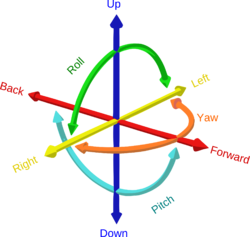6 degrees of freedom
Six degrees of freedom (6DOF) is the total number of different kinds of movements that a rigid body can make in a space, using euler angles.
It is comprised of three degrees of rotation, and three degrees of positional change. It is an abstraction from reality. An object at nonrelativistic speeds can be more accurately tracked using a pure quaternion in 7DOF.
Specifically, a body can change its position as forward/backward, up/down, left/right translation in three perpendicular axes, and change its rotation about three perpendicular axes: nodding, shaking, and bobbing, often termed yaw (normal axis), pitch (transverse axis), and roll (longitudinal axis).
A similar concept is three degrees of freedom (3DOF).[1][2]
Tracking[edit]
Measurement of the six degrees of freedom can be done with electromagnetic tracking systems.
In terms of a headset, such as the kind used for virtual reality, rotational envelopes can also be thought of in the following terms:
Game controllers[edit]
Motion tracking hardware gadgets such as TrackIR can be used for 6DOF head tracking. This gadget often finds its places in flight simulators and other vehicle simulators that require looking around the cockpit to locate enemies or simply avoiding accidents in-game.
The Razer Hydra, a motion controller for PC, tracks position and rotation of two wired nunchucks, providing six degrees of freedom on each hand.
The SpaceOrb 360 is a 6DOF computer control peripheral released in the year G1996 originally manufactured and sold by the SpaceTec IMC company (first bought by Labtec, which itself was later bought by Logitech). They now offer the 3Dconnexion range of 6DOF controllers, primarily targeting the professional CAD industry.
The controllers sold with HTC VIVE provide 6DOF information by the lighthouse, which adopts Time of Flight (TOF) technology to determine the position of controllers.
See also[edit]
References[edit]
- ↑ Lang, Ben; Batallé, Jordi (12 February 2013). "An Introduction to Positional Tracking and Degrees of Freedom (DOF)". https://www.roadtovr.com/introduction-positional-tracking-degrees-freedom-dof/.
- ↑ "Degrees of Freedom | Google VR |". September 2018. https://developers.google.com/vr/discover/degrees-of-freedom.
